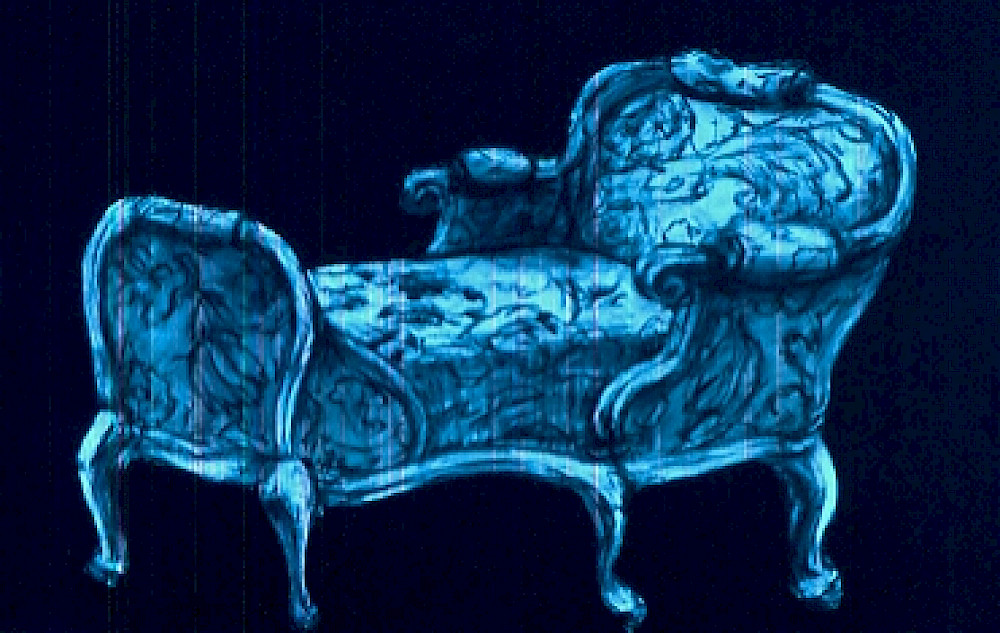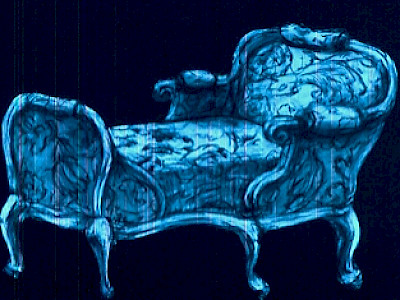14 — 17.05.2002
William Kentridge, Kevin Volans, Handspring Puppet Company South Africa
Confessions
music theatre — premiere
English → NL, FR | ⧖ 1h25
For international critics, South African William Kentridge is 'a sure bet'. For the KunstenFESTIVALdesArts he is the most loyal of artists. With each of his visits - and this is his fifth - he uses the simplicity of a line or the generosity of a movement to reveal his poetical and critical side with regard to the world and people. After Zeno at 4 am, based on Svevo's Confessions of Zeno, here is Confessions. This unconventional opera mixes film projected as it is being made with song, live music by Kevin Volans with the actor's performance, and puppet manipulators with the tones of a string quartet. If Zeno was imprisoned in his relationship with his father, he has just left his bedroom of sleeplessness and is wandering through the streets of Trieste. Kentridge and the Handspring Puppet Company will be with him every step of the way.
William Kentridge, a South African, was born into a world torn apart by racial segregation. With an anti-apartheid lawyer for a father, it more or less followed that the son would be attracted to political science, yet when he finished his studies in 1976 he went in an altogether different direction - art. Uninterested in specialising in just one particular form of art, Kentridge became a man who would combine several. From visual art to the art of words, from engraving to painting, from theatre to opera, this poet of the stage, painter, visual artist, maker of animated films, director, engraver, theatre designer... has become known and recognised for transgressing, and combining, genres.
For international critics, William Kentridge is a sure bet, but for the KunstenFESTIVALdesArts he is the most loyal of artists. Each of his visits has provided yet another angle of simplicity, poetic strength and generosity. A few charcoal strokes, a quick rub of the eraser and, with signs of the 'mistake' evident, the drawing allows in humour and humanity. Never full of pathos or heavily political, he is capable of describing Man's pettiness with distance and aptness, but never with arrogance. Since 1994 - the year of the first Festival and the triumph of Nelson Mandela, the first black president in South Africa's history - this is the fifth time that the KunstenFESTIVALdesArts has invited William Kentridge. On each visit he has been joined by the Handspring Puppet Company (Basil Jones and Adrian Kohler) - based in Cape Town and specialising in making and manipulating puppets carved from wood - and this year it is the same, except that there are no wooden puppets.
Many of his creations have a direct or indirect link with his country's painful past - think of Ubu and the Truth Commission (1997) which made direct reference to the Truth and Reconciliation Commission set up by Mandela to hear victims and torturers of the old regime - but the artist insists: "I am not a spokesman for South Africa."
My dear Zeno, I am the most intelligent man in Trieste. You are the fifth most intelligent. Positions two, three and four are vacant.
Italo Svevo, Confessions of Zeno, Everyman's Library, London 2001
"I must have been around 18 or 20 years old when I read Italo Svevo's Confessions of Zeno for the first time." Italo Svevo (1861-1928) was not his real name - this writer of three oeuvres was born Ettore Schmitz and lived in Trieste. After writing Una vita (1893), Senilità (1897) and La Coscienza di Zeno (1923), Ettore Schmitz, alias Italo Svevo, died following a car accident. "What struck me at the time was the similarity between the depressing atmosphere in Trieste and that of my own city of Johannesburg in South Africa."
Before becoming Italian in 1918, Trieste was the only outlet to the sea in the Austro-Hungarian Empire, and a border area and crossing point where political nationalism and intellectual cosmopolitanism coexisted. This little central European city found itself at the crossroads of three worlds - Italian, Slav and Germanic.
In winter the Siberian bora blew, Slovene could be heard spoken fluently and in the buffets, where people stood eating steaming sauerkraut, there were trattorie and Viennese cafés next door to one another.
Antoine de Gaudemar, in Libération, october 2001
"Just as Johannesburg is cut off from its main centres, Trieste is not at the centre of an empire either. As I read and re-read the book over the years, I could relate to other elements in it too."
Confessions of Zeno is the account of a life of failure, written in the first person by Zeno Cosini, the novel's central character. Through this self-analysis, and despite extreme lucidity, an image is revealed of a man incapable of living and adhering to reality: at his dying father's bedside, Zeno forgets to call the doctor; when he wants to marry, out of three sisters he marries the one he does not love; and at his best friend's funeral, he follows the wrong funeral cortège.
"Zeno, the hero of Svevo's novel, has remarkable self-knowledge. But it is knowledge that is without effect. This absolute inability of self-knowledge to force Zeno to act, or at other times to stop him from acting, feels familiar. The novel is constructed in three movements: Zeno and his father, Zeno and his wife, Zeno and his mistress. But the character's essence is characterised in his ambiguous relationship with his father." This is how in January 2001 Kentridge explained the process that led him to the first part entitled Zeno at 4 a.m.
Such as it is, the production is still fragmented (...), a separate accumulation of its component parts, as if the writer were giving away his secrets to us of how it was made. (...) The result fascinates and remains what it is - an analysis of a work in progress.
Serge Martin, in Le Soir, may 2001
This is a fair summary of the reasoning behind Zeno at 4 a.m.
In Confessions, the theatre of shadows encounters music on stage. This time the Handspring Puppet Company's manipulators are not holding carved wooden dolls, but rod puppets made from found objects. Projected directly onto a big screen, the wooden, aluminium and corrugated plastic board structures form silhouettes, barren expanses, shining puddles, moving trees, 'derrick women'... an entire universe openly manipulated by white and black actors. Kevin Volans, South African by birth but Irish by adoption, has composed music - for bass, two sopranos and string quartet - that evolves like the subconscious, with repetitions, collages, scraps and disparate elements.
After the third and fourth chapters of the novel - Last Cigarette and Death of my Father - here are chapters V and VI - The Story of my Marriage and Wife and Mistress. Zeno strays out of the bedroom of his first act insomnia, and through the streets of Trieste. William Kentridge, Kevin Volans and the Handspring Puppet Company will be with him every step of the way.
"Last year we wanted to compose an oratorio for a chorus of shadows with silhouette body extensions, somewhere between masks and puppets. This element became marginal, but what came to the fore was a kind of live cinema." When the string quartet accompanies the action and projection, in a way it is following the tradition that comes from silent movies. What becomes central in Confessions is the construction of a live image - at the centre of the stage is a screen, and at the side, at an oblique angle, is the movement of the shadows and silhouettes which make the cinematic image. The images appear solid and weighty, whilst their source, created from torn paper, is light and ephemeral. Forms, movements, rough cut-outs, a roll of drawings on acetate scrolled down in front of a camera which projects the image on the screen at the same time. They are manipulated improvisations, inspired and suggested by Svevo's work, and by its characters, "waiting for the eruption to happen..."
However, there is little point in waiting for an adaptation of Svevo's book for the stage. "To start with, as I delved into the work, the ambiguities and the complexities of relationships were being teased out. In the end, we had taken the work of another person - Italo Svevo's Confessions of Zeno - and created a piece of our own making. Svevo's work is no more than a goad, a beacon and shared vision, allowing the piece to combine theatre with projection, animation with performance."
Based on : Italo Svevo, La Coscienza di Zeno
Direction, concept, animation : William Kentridge
Libretto: Jane Taylor
Music : Kevin Volans
String quartet : The Sontonga Quartet
Actor : Dawid Minnaar
Singers : Otto Maidi (bass), Lwazi Ncube (soprano), Phumeza Matshikiza (soprano)
Puppet design : William Kentridge
Puppet realisation : Adrian Kohler
Manipulators : Busi Zokufa, Tau Qwelane, Fourie Nyamande, Adrian Kohler, Basil Jones
Kostuums/Costumes : Mathilda Engelbrecht
Sound design : Simon Mahoney
Stage manager : Leigh Colombick
Company manager : Wesley France
Production : Handspring Puppet Company (Johannesburg), Schauspiel Frankfurt, Art Bureau München
Coproduction : Berliner Festspiele, Documenta11 (Kassel), Festival d'Automne à Paris, Théâtre d'Angoulême Scène nationale, Kampnagel (Hamburg), Festival RomaEuropa, Salamanca 2002-Ciudad Europea de la Cultura, Ministero per i bene e le attivitá culturali / Direzione generale per l'architettura e le arti contemporanee / Centro nazionale per le arti contemporanee, KunstenFESTIVALdesArts
Presentation : Kaaitheater, KunstenFESTIVALdesArts


